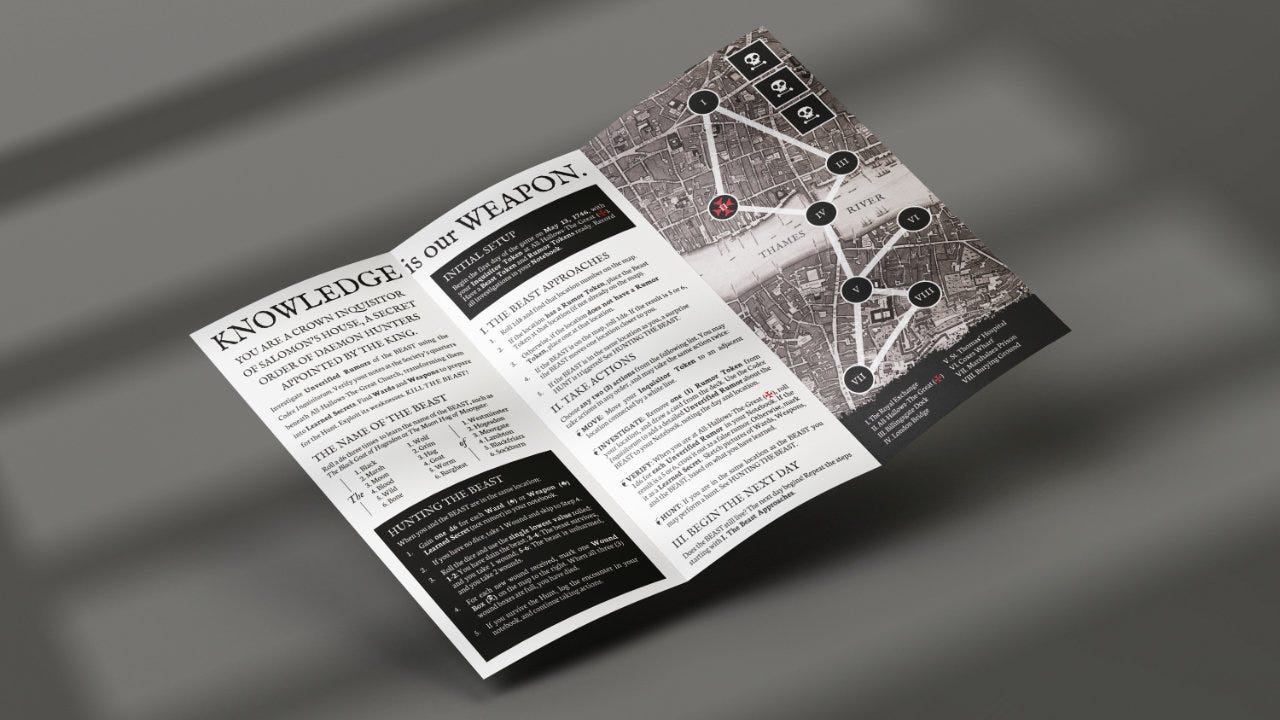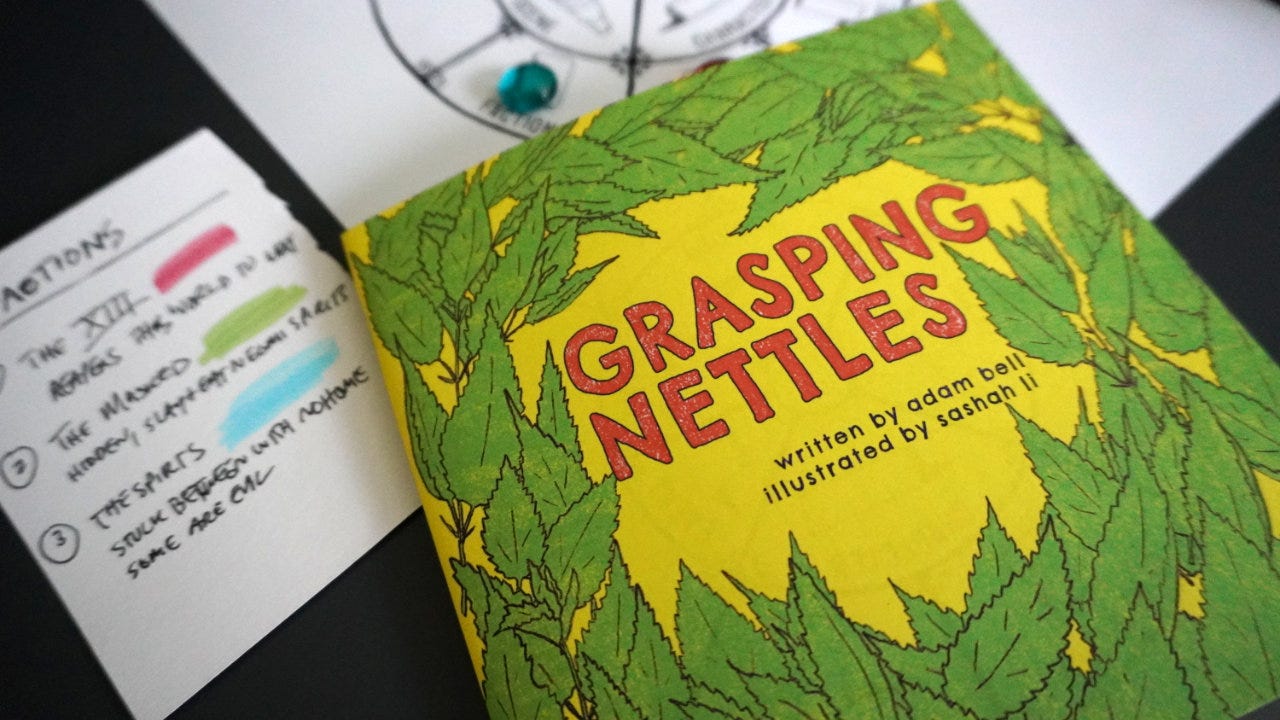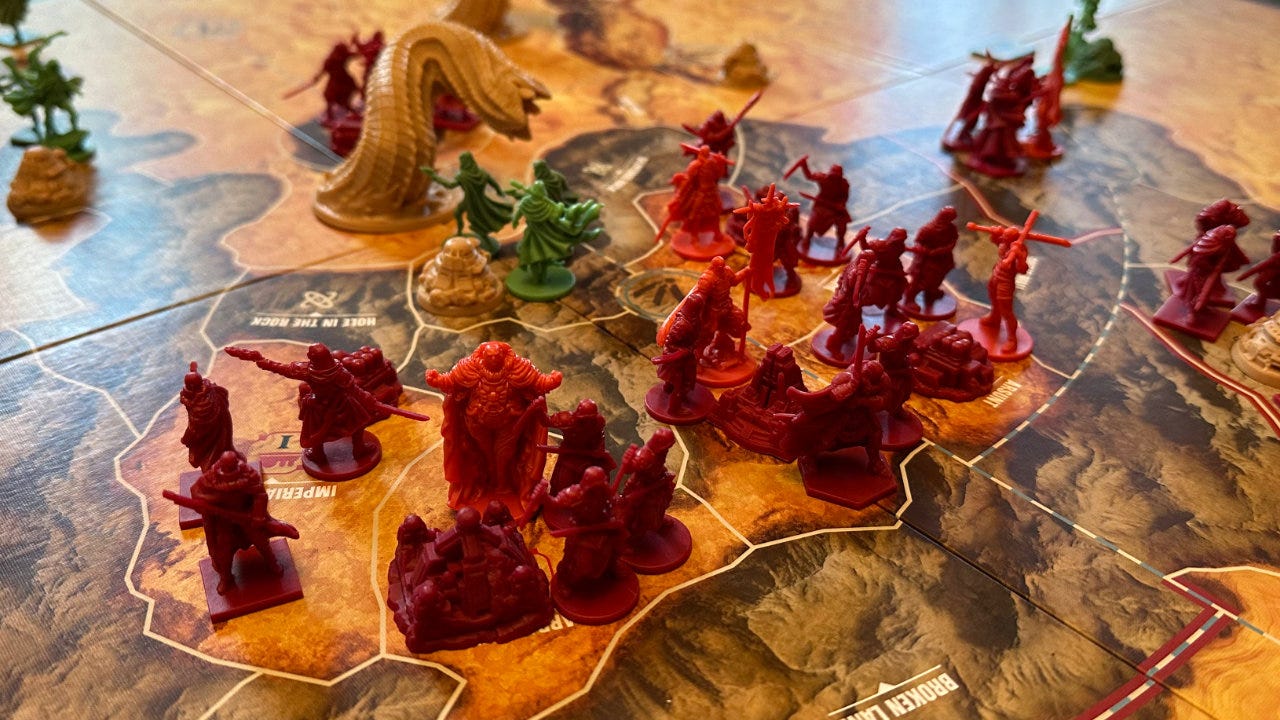d8 Best practices for random tables
One-Page RPG Jam 2024, rondels in TTRPGs, random tables, and Dune
Welcome to Exeunt Omnes, the official newsletter for loyal fans and sworn enemies of Exeunt Press, creator of games such as Exclusion Zone Botanist and Eleventh Beast. You can find digital games at games.exeunt.press and physical products at shop.exeunt.press.
TL;DR Summary
📝 One-page RPG Jam starts soon
🌿 Using rondels in TTRPGs
📋 d8 Best practices for random tables
🎲 Recently played: Dune: War for Arrakis
📝 One-page RPG Jam starts soon
The One-Page RPG Jam hosted by Unknown Dungeon begins July 21, 2024 and runs through August 25, 2024.
In its fifth year, this jam holds a special place in my heart. One of my first attempts at a one-page game, Exclusion Zone Botanist was a jam entry that ended up receiving an ENNIE nomination with over 20k downloads at last check. It has since been updated with improved layout and additional art in the zine edition.
Last year I entered Eleventh Beast, which also has since been updated with a zine edition.
This year I’d like to share what I’ve learned with others! Starting July 21, watch for a week-long series on how to make your own one-page RPG at Skeleton Code Machine. One part will be posted each day. If you’ve never made a game before, this is your chance!
JOIN: One-Page RPG Jam hosted by Unknown Dungeon
🌿 Using rondels in TTRPGs
In Grasping Nettles and Rondels I gave some suggestions on how rondels might be used in TTRPGs.
A rondel mechanism uses pie-shaped wedges in a circle to show the available actions. Players move tokens around the circle to select actions, usually based on where the tokens land.
While common in board games, rondels are less common in TTRPGs. So I was pleasantly surprised to find a rondel as a core mechanism in Adam Bell’s Grasping Nettles!
I hope it inspires you as much as it did me!
READ: Grasping Nettles and rondels at Skeleton Code Machine
Skeleton Code Machine is a weekly publication that explores tabletop game mechanisms in board games and roleplaying games. It’s been called a “Seemingly endless source of gaming ponderings” and a “Goldmine.” Check it out at www.skeletoncodemachine.com.
📋 d8 Best practices for random tables
With two MÖRK BORG projects in the works, I’ve been thinking about random tables quite a bit. Whether its a small d8 list of cursed items or a large d66 table of encounters at sea, making a list can be a challenge. Making a good list is even harder.
I’ve tried to come up with a list of “best practices” for random tables that might help you make your own:
Clear purpose: The random table needs a clearly defined scope and purpose. I’ve also found the more narrow the scope, the easier it is to be creative. I would struggle with “d8 Things Found in the Ocean” but would find “d8 Things Found Sunk in the Providence Bay” much easier to write.
Thematic consistency: It’s usually easy to stick with the chosen theme, but it can be hard to ensure all the items work together as a single collection. I prefer tables where all the entries have more in common than just a broad theme. For example, if it is a list of random items, they might all be the same size (big vs. small) and would reasonably be found together.
Diverse impacts: Certainly some random tables all have one type of impact, such as a list of cursed items (i.e. all cause bad things). It can be fun to mix it up, however, and balance the list with good, bad, and neutral impacts. Even in a list of cursed items, having one item that is (almost) a blessing can be fun.
Balanced utility: Similar to having a diversity of impacts, balancing the utility of the items can make a more interesting table. Items can form a spectrum from ones that are very useful/powerful to some that are boring/mundane.
Ease of use: When running a campaign, the GM will sometimes want to quickly use your random table to fill in a gap in the story. I personally am the type that tries to prepare quite a bit, but will fall back on random tables when necessary during a game. With that in mind, keep your descriptions short and functional.
Inspire vs. explain: Related to keeping the descriptions short, just a few words can usually inspire a GM or solo player. There are exceptions, but the goal should be to inspire the reader rather than give them detailed rules and mechanisms.
Surprise and creativity: Some tables can almost write themselves. Most people can easily come up with “d6 Things Found in a Grave”. It’s hard, but try to throw in some surprises and unexpected entries to maintain interest.
Easy to expand: Related to inspiring the reader, the ideal entry is open ended and can be expanded when necessary. Rather than just leaving the GM with nowhere to go, a great entry feels almost like the hook at the beginning of a longer story.
Is “best practices” the best thing to call this list? Tips, perhaps? There is no “best” way to make a random table, of course, because it’s such a broad category of writing and creativity. But I hope that this list gives you some things to think about, and makes your next random table a little easier to write!
Also, while not included in the list above, consider adding some weighted probability to your table. Rolling 2d6 on a list of items numbered 2 - 12 can give you a bell curve weighted toward the middle. Items 2 and 12 would be rare, but special.
How do you feel about random tables? Is the occasional random table something you’d want to see included in this newsletter? Or perhaps available somewhere else?
🎲 Recently played: Dune: War for Arrakis
Dune: War for Arrakis (Maggi & Nepitello, 2024) has become one of my favorite games of all time. It perfectly captures the feel of the Dune factions. House Atreides and Fremen control the deserts but are weak, forced to make quick attacks and then retreat back to the sand. House Harkonnen controls strong armies and an onslaught of vehicles, but quickly learn to fear the desert and its worms.
It has a really clever dice placement action selection mechanism, and combat is fast and consequential. Every mechanism is thematically tied to the overall story.
If it has a downside, it is the giant box of plastic required to play. Setup and takedown times are non-trivial.
PLAY: Dune: War for Arrakis
Thanks for subscribing to Exeunt Omnes!
Check out games.exeunt.press for all the latest games and resources!
- E.P. 💀






I came back and referenced the notes about d8 random tables today while making a random scenario table as part of a postcard mailer. Much obliged for the thoughts.
I love that you pointed out thematic consistency here. It’s an issue that comes up a lot for me with random tables, and when they have thematic consistency it’s so much easier to roll with (haha).